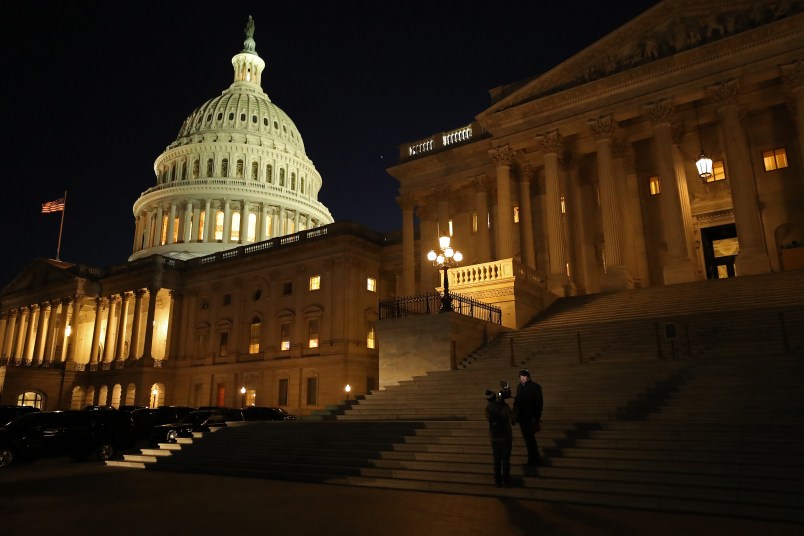Tuesday’s debate about impeachment trial procedures served as a proxy war for the broader arguments the House and President Trump’s attorneys will make about the conduct at the heart of the impeachment proceedings.
Minority Leader Chuck Schumer (D-NY) forced eleven votes on subpoenas for documents and witness testimony to be secured at the beginning of the trial. The gambit that stretched Tuesday’s proceedings until nearly 2 in the morning, before the GOP Senate could pass the resolution proposed by Majority Leader Mitch McConnell (R-KY) that would delay subpoenas decisions until much later in the trial.
Each amendment vote failed, but the exercise provided an opportunity for the House managers to preview the major points they plan to make in their impeachment case. Sen. Susan Collins (R-ME) broke with Republicans in favor of one Dem amendment that would have extended the deadlines for certain motions to be filed.
During a debate over authorizing a subpoena for State Department documents, Rep. Val Demings (D-FL) reminded the senators — and the watching American public — who in the department was aware of and involved in the Ukraine pressure campaign, by citing the testimony of the diplomats who did cooperate with the House impeachment inquiry.
Rep. Jason Crow (D-CO), a military veteran with a Bronze star, argued in favor of the document subpoenas targeting the Department of Defense and the Office of Management and Budget. While doing so, he stressed the national security implications of the Trump-ordered hold on military aid to Ukraine.
Acting White House Chief of Staff Mick Mulvany’s pivotal role in implementing the Ukraine quid pro quo meant that Rep. Hakeem Jeffries (D-NY), as he argued for a Mulvaney witness subpoena, could recount all the various episodes that involved the OMB chief.
He played a clip of Mulvaney admitting the aid-for-investigations trade-off, and detailed the testimony of various officials who traced the efforts back to the highest ranking White House staffer.
House Intelligence Chairman Adam Schiff (D-CA) argued against McConnell’s underlying procedures resolution. His arguments in favor of subpoenas issued immediately played the dual role of explaining the House’s second article of impeachment, which alleges obstruction of Congress, as he detailed the stonewalling the White House did in the House impeachment inquiry.
The opposition expressed by President Trump’s attorneys to the various subpoena measures was less focused on the specific records and testimony being sought. Instead, Trump’s legal team used their debate time to lob their more general complaints about the House impeachment inquiry process. The Trump attorneys also pivoted towards defending the Trump conduct that the House managers had pointed to in arguing for the subpoenas. And in turn, the House managers reserved some debate time to then rebut those defenses.
When Trump personal attorney Jay Sekulow argued that the Ukraine assistance eventually flowed, Schiff countered that Congress had to take additional steps to ensure that the aid was finally sent to Ukraine because the hold had lasted for so long.
When Deputy White House Counsel Mike Purpura claimed that the Ukraine never knew about the aid freeze before it was made public, Schiff brought up the multiple administration officials and public reports that indicated Ukraine was aware of the hold before the first public reports.
By tying the procedural debate to the substance of their case against the President, the House impeachment managers elevated Tuesday’s proceedings.
Schiff made their importance explicit as he kicked off the debate over the resolution Tuesday afternoon.
“I believe the most important decision in this case is the one you will make today, the most important question is the question you must answer today: Will the president and the American people get a fair trial?” Schiff said.
As the night crept into the early morning, tensions escalated and the focus of the arguments deteriorated bit. House Judiciary Chairman Jerry Nadler (D-NY) accused the President’s legal team of lying and the Senate GOP of helping Trump cover-up his crime, prompting an equally spicy retort from Trump’s lawyers.
The heated rhetoric earned an admonishment from Chief Justice John Roberts, who urged both parties to be more respectful in the rhetoric they use in front of the Senate.
The entire exchange overshadowed the meticulous case Nadler made for subpoenaing former National Security Advisor John Bolton.
White House counsel Pat Cipollone sought to take advantage of the exhaustion setting over the chamber as the debate over subpoenas stretched several hours. He suggested the House was wasting the Senate’s time with a debate that amounted to a disagreement over “when” to decide to subpoena witnesses documents.
“There will be no when,” Schiff shot back, arguing that the White House was not going to have an “epiphany” about supporting subpoenas later on in the trial.
“A vote to delay is a vote to deny.”



